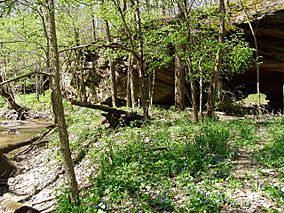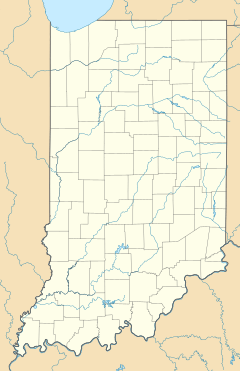Portland Arch Nature Preserve facts for kids
Quick facts for kids Portland Arch Nature Preserve |
|
|---|---|

Portland Arch from the south
|
|
| Location | Fountain County, Indiana |
| Nearest city | Fountain |
| Area | 435 acres (1.76 km2) |
| Governing body | Indiana Department of Natural Resources |
| Designated: | 1973 |
Portland Arch Nature Preserve is a special natural area in Fountain County, Indiana, USA. It covers about 435 acres (1.76 square kilometers) of beautiful land. This preserve is famous for its amazing rock formations, especially a natural stone bridge. It's even called a National Natural Landmark because it's so unique!
The preserve gets its name from a nearby town, Fountain, which used to be called Portland. The natural arch itself was carved by a small stream over many, many years. The Indiana Department of Natural Resources takes care of this wonderful place. It protects the wooded valleys, deep ravines, and rocky cliffs around Bear Creek.
Contents
The Story of the Rocks: How Portland Arch Was Formed
Portland Arch is one of the few natural arches you can find in Indiana. A natural arch is like a bridge made of rock, created by nature.
How the Arch Was Carved
This amazing arch was formed by Bear Creek. Over a very long time, the creek slowly wore away the rock on both sides of a cliff. The rock here is called Mansfield Sandstone. This sandstone was strong enough to hold up, so it didn't collapse. Instead, it formed the arch we see today.
Ancient Sandstone
The Mansfield Sandstone is incredibly old. It formed during the Pennsylvanian Period, which was about 323 to 299 million years ago! Imagine how long ago that was!
The layers of sandstone show something called cross stratification. This means the layers are angled. They formed in a shallow lake where the water got deeper. The slope of these layers shows where the shallow water met the deeper parts of the lake.
Rock Shelters and Falling Rocks
Places like Portland Arch were important to people long ago. Native Americans and early pioneers used these natural rock shelters for protection.
You might also see piles of broken rocks at the bottom of the valleys. These are called talus rocks. They have fallen from the cliffs above over time.


